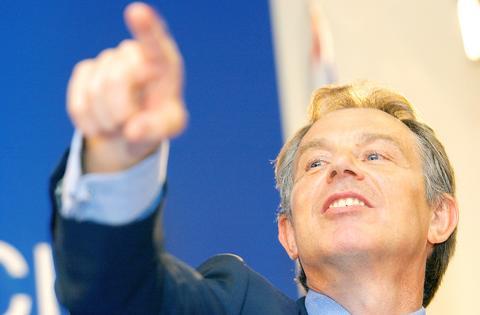European leaders, reaching across the fault lines of last century's battlefields, said on Friday that they had struck a deal on a European constitution, the latest step in the gradual but creaking process toward a more united continent.
Under the agreement, for the first time, the continent -- through the 25-nation EU -- would have a president, a foreign minister and a single rule book to replace the web of treaties that govern the complex relationships among the union's member countries. But the constitution still faces a hard test: ratification by all 25 members, which could be exceedingly difficult in the face of strong skepticism in some countries and voter apathy. At least seven of the nations have decided to ratify the pact by referendum.

PHOTO: AP
While the leaders toasted their success with champagne, the past two days were marked by dogged and at times polarized talks that ended in compromises many participants strongly criticized. Many of the compromises limited the scope of decision-making in sensitive areas such as taxation and social issues. Negotiators inserted what they called "emergency brakes" for countries worried about retaining their national prerogatives, notably Britain.
"We have to move at the pace of the slowest camel in the train," said John Palmer, director of the European Policy Center in Brussels.
The constitution is a legalistic document of nearly 350 articles -- perhaps not what leaders had envisioned when they called for a "more democratic, more transparent and more efficient" system at a meeting two-and-a-half years ago in Brussels.
But it contains a string of innovations. Among them is creation of a European public prosecutor, a sort of nascent federal attorney-general who would be responsible for investigating and bringing to trial those cases where the EU's financial interests are at stake. According to officials, they could involve crimes like fraud in the EU budget or counterfeiting of euro notes and coins. Ultimately the prosecutor could also be responsible for prosecuting "serious crime having a cross-border dimension."
There are also provisions for countries to take part in special combat units if they choose, an issue closely watched by Washington; and for closer cooperation on military procurement.
"This is definitely a step forward," said Marco Incerti, research fellow at the Center for European Policy Studies. "They have increased transparency and simplified the institutions to some extent."
With its demands to keep a national veto on a wide range of issues including taxation and foreign policy, Britain was pitted against France and Germany, whose delegations were grinding their teeth at what they saw as their neighbor's intransigence.

A fire caused by a burst gas pipe yesterday spread to several homes and sent a fireball soaring into the sky outside Malaysia’s largest city, injuring more than 100 people. The towering inferno near a gas station in Putra Heights outside Kuala Lumpur was visible for kilometers and lasted for several hours. It happened during a public holiday as Muslims, who are the majority in Malaysia, celebrate the second day of Eid al-Fitr. National oil company Petronas said the fire started at one of its gas pipelines at 8:10am and the affected pipeline was later isolated. Disaster management officials said shutting the

US Vice President J.D. Vance on Friday accused Denmark of not having done enough to protect Greenland, when he visited the strategically placed and resource-rich Danish territory coveted by US President Donald Trump. Vance made his comment during a trip to the Pituffik Space Base in northwestern Greenland, a visit viewed by Copenhagen and Nuuk as a provocation. “Our message to Denmark is very simple: You have not done a good job by the people of Greenland,” Vance told a news conference. “You have under-invested in the people of Greenland, and you have under-invested in the security architecture of this

Japan unveiled a plan on Thursday to evacuate around 120,000 residents and tourists from its southern islets near Taiwan within six days in the event of an “emergency”. The plan was put together as “the security situation surrounding our nation grows severe” and with an “emergency” in mind, the government’s crisis management office said. Exactly what that emergency might be was left unspecified in the plan but it envisages the evacuation of around 120,000 people in five Japanese islets close to Taiwan. China claims Taiwan as part of its territory and has stepped up military pressure in recent years, including

UNREST: The authorities in Turkey arrested 13 Turkish journalists in five days, deported a BBC correspondent and on Thursday arrested a reporter from Sweden Waving flags and chanting slogans, many hundreds of thousands of anti-government demonstrators on Saturday rallied in Istanbul, Turkey, in defence of democracy after the arrest of Istanbul Mayor Ekrem Imamoglu which sparked Turkey’s worst street unrest in more than a decade. Under a cloudless blue sky, vast crowds gathered in Maltepe on the Asian side of Turkey’s biggest city on the eve of the Eid al-Fitr celebration which started yesterday, marking the end of Ramadan. Ozgur Ozel, chairman of the main opposition Republican People’s Party (CHP), which organized the rally, said there were 2.2 million people in the crowd, but